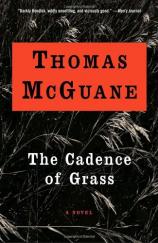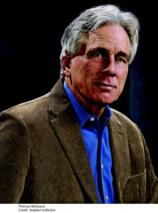Reading Group Guide
Discussion Questions
The Cadence of Grass

1. What kind of person is Paul Crusoe? Is he likeable, charming, and funny? Or is he repellent and predatory, even evil? What does he ultimately want from the bottling plant and from the Whitelaw family? Why is Evelyn drawn to him despite the fact that she perceives that his soul is "rented to darkness" [p. 129]?
2. Paul suffered a blow, we're told, "in sixth grade, when his mother told him the disturbing story of his conception involving a father she described as little more than a worthless stranger, an all-consuming vacancy that suddenly gave his young life a cartoonish quality complete with flying faces, dither, interruptions and babble. He also missed the God that had been described in his small-town grade school, a terrible old tyrant who seemed to demand all the wheedlings and importunings mankind could send his way" [p. 28]. To what degree does this information—and his later meeting with his father [pp. 143–48]—account for the apparent lack of both conscience and purpose in Paul's life?
3. How does McGuane's inclusion of bizarrely comic events—such as Evelyn's night in the snowstorm and her rescue by Donald Aadland [pp. 87–105] or Paul's waking up in Las Vegas to discover a neat row of stitches across his abdomen [pp. 122–25]—affect the reader's sense of reality in the novel? Does it seem that in McGuane's comic world, a more manic, skewed vision of life is the norm?
4. Paul Crusoe shares the last name of the title character of Daniel Defoe's novel Robinson Crusoe. Why might McGuane have chosen to make this allusion to Defoe's book?
5. Why has Donald Aadland returned to the ranch after his life in San Francisco? What makes him such a delightful character?
6. How does McGuane use the presence and power of nature—the plain, the mountains, the wind—as a force in the novel? What is the effect of the detailed descriptions of ranch activities? What is the meaning of the title?
7. After rereading a few particularly striking phrases, sentences, or passages, how would you describe McGuane's prose style? What is unique or idiosyncratic about his use of language?
8. Bill Champion and Evelyn seem to occupy the story's moral and emotional center. What is the nature of their bond? What knowledge or sensibility do they share that the rest of the characters lack?
9. How does the mood of the novel change when Evelyn and Bill work with the animals on the ranch? Is McGuane suggesting that the animals and their needs exist in a separate world? How does Evelyn respond to the necessities and rhythms of ranch life?
10. Does it come as a surprise that Bill Champion is the father of Evelyn and Natalie? Why does Alice choose Sunny Jim over Bill? What do Paul and Sunny Jim have in common?
11. Which scenes best exemplify McGuane's comic talent? How would you describe his sense of humor and his view of human nature?
12. We're told of Evelyn, "She tried to take in her happiness and decided it might consist of nothing more than living by herself. Sometimes it was loneliness, sometimes freedom" [p. 49]. The death of Bill Champion will leave Evelyn truly alone, but McGuane chooses not to describe Evelyn's reaction to Bill's loss. How do you imagine Evelyn's life at the ranch without Bill?
13. Who is Majub, and how has he come to be involved in the family fortunes? What motivates him? How does his predatory capitalism (or criminality) contrast with the traditional economy of ranch life?
14. What happens during the book's final episode? Who kills whom, and why? Why has Bill gotten involved in this business? Who ultimately wins, and who loses? Who is Red Wolf, and what role does he play in Bill Champion's life and death?
15. McGuane's fiction is full of satire and sardonic humor, yet in The Cadence of Grass, as elsewhere in his work, he is passionately engaged in detailing the social, economic, and ecological problems of Montana and other areas of the West. What is the effect of this combination of humor and seriousness?
The Cadence of Grass
- Publication Date: May 13, 2003
- Paperback: 256 pages
- Publisher: Vintage
- ISBN-10: 0679767452
- ISBN-13: 9780679767459








